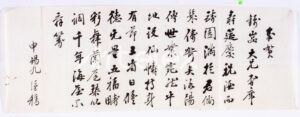Shin Seok-gu (1875–1950) was a prominent Korean Methodist pastor, poet, and independence activist, best known as one of the 33 national representatives of the March 1st Movement in 1919. His handwritten poetic manuscript from 1930 is a powerful testament to both his literary talent and moral steadfastness during a time of political oppression.
✍️ Biography: A Life of Faith and Resistance
Born into a Confucian household, Shin Seok-gu initially studied classical Chinese literature before converting to Protestantism in 1907. He was ordained in 1917 after studying at Hyupsung Theological Seminary.
As an active participant in the March 1st Movement, Shin was imprisoned by Japanese authorities. Throughout the colonial period, he resisted forced participation in Shinto shrine worship and rejected Japan’s surname-change policy in 1940, marking him as a dissident.
After Korea’s liberation, Shin opposed the North Korean regime and remained with his congregation in Pyongyang despite threats to his safety. He was executed by firing squad during the Korean War for his anti-communist stance.
In 1963, he was posthumously awarded the Order of Merit for National Foundation (Presidential Medal). His statue stands today in Samil Park, Cheongju, honoring his legacy.
🖋️ Featured Work: Celebrating the Honorable Elder Geumam’s Longevity Banquet (1930)
This poetic manuscript, written in classical Chinese, reflects Shin Seok-gu’s Confucian-Christian values and literary refinement. Below is an English translation:
Celebrating the Honorable Elder Geumam’s Longevity Banquet
At the celebratory banquet of longevity, there is wine, and we raise a toast.
How many, if any, could match your perfect character?
How splendid it is, the enterprise passed down through generations in Luoyang.
It resembles the immortal canopy set upon the flatlands.
Your self-discipline is such that you reflect thrice daily,
And your cultivation of virtue knows no bounds, earning you the Five Blessings.
In the fragrant garden of orchids, the colorful dancers move in harmony with the melodies of the gayageum,
And the thousand-year-old Sea Pavilion offers omens without hesitation.Respectfully written by Shin Seok-gu
🧭 Historical and Cultural Value
-
Combines classical Chinese literary aesthetics with Korean spiritual values.
-
Reflects resistance through cultural identity and moral conviction.
-
Serves as a rare historical manuscript by a March 1st independence activist.
-
Demonstrates the intellectual life of clergy resisting Japanese imperialism.

